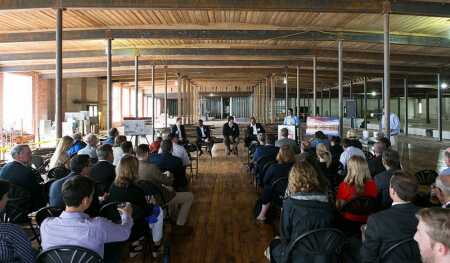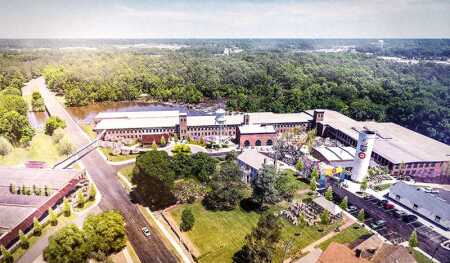North Carolina’s Capitol Broadcasting Company is betting on transformational redevelopment of a historic mill site to revive a region. At a ULI Triangle event, representatives of the Raleigh-based media company described the firm’s plans to redevelop a historic cotton mill, turning it into a destination for millennials, attracting business and industry, and ultimately shifting the fortunes of the eastern North Carolina town of Rocky Mount.
The plans are ambitious: by 2019, the redeveloped Rocky Mount Mills is to hold 125,000 square feet (11,600 sq m) of office space, 75,000 square feet (7,000 sq m) of loft apartments, plus retail, event, and conference space. The broader campus—covering 150 acres (61 ha)—will also include almost 70 restored mill houses for rent, three restaurants, six breweries, and a “tiny homes” motel.
The sprawling, 225,000-square-foot (21,000 sq m) factory is located at a bend in the Tar River and has sweeping water views. Founded in 1816, Rocky Mount Mills provided cotton yarn for Confederate uniforms and thrived in the early 20th century. But textile manufacturing moved overseas in the later part of the century, and the mill began to suffer. At the same time, revenues from tobacco—the region’s other big industry—started to dwindle. In 1996, the mill closed, and Rocky Mount’s fortunes took a dive.
“The mill was one of the leading businesses here. When it shut down, it was a daily reminder [to Rocky Mount residents] that ‘we failed,’” said Michael Goodmon, vice president of real estate at Capitol Broadcasting. “Now, they can be proud of it.”
Goodmon and his father, James Goodmon, chief executive officer of Capitol Broadcasting, first encountered the factory a decade ago. “We thought it was the most beautiful mill we’d ever seen,” recalled Michael Goodmon. “We saw it as a great opportunity and were excited to tackle it.” The company reportedly paid $4 million for the complex.
At the time, Capitol Broadcasting was coming off a big success. Phase one of the American Tobacco Campus, an ambitious redevelopment of a tobacco factory in Durham, had been completed in 2004 to great acclaim, and the project kicked off a renaissance in Durham that continues today.
But the American Tobacco Campus is located in the middle of the state’s thriving Triangle region, and it leveraged the presence of the Duke University and software firms that wanted to be near downtown, as well as the popular Durham Bulls minor league baseball team and nearby stadium.
The new project has few of those advantages. Rocky Mount has a moribund downtown and a dwindling population; its median income is $36,000—compared with the statewide figure of $48,000—and the poverty rate is almost double that of North Carolina as a whole. The professionals who fill offices at the American Tobacco Campus and spend their money at the complex’s bars and restaurants do not exist in large numbers in Rocky Mount.
Young people will have to be imported, most likely as workers at companies relocating to the area. But firms will not lease office space and bring their workers unless they have the sense that Rocky Mount Mills is a promising place to be. “It’s a chicken-and-egg question,” said Goodmon.
Some of that can be overcome with a savvy marketing campaign. Though Rocky Mount has traditionally been viewed as part of the state’s coastal plain, Raleigh is only 45 minutes away on a four-lane highway.
But Capitol Broadcasting is also doing its best to turn the complex into an interesting destination. The 70 restored mill houses—which rent for roughly $950 per month, above market rate for the region—come with renovated kitchens and bathrooms, lawn furniture, and backyard grills. Every house is already occupied, and the residents provide a ready customer base for the complex’s restaurants and events.
The beer and breweries are another key element of the company’s strategy. “We think this is the first of its kind in the country,” Goodmon said of the project’s beer-related plans. The site includes four brewery incubators—spots where brewers can get their start without immediately having to invest in expensive equipment—and space for two other brewing operations. The environment, with food trucks, breweries, and music on the lawn, is new to Rocky Mount, but so far the approach is going well: in only three months, the earliest brewery exceeded its first-year projections.
Goodmon and his team are open to other ideas as well. They are working with a local community college on a brewing certification program—a classroom is located on the campus—and are planning to create a tiny-homes motel, with 190-square-foot (18 sq m) units. A 7.5-acre (3 ha) island in the middle of the river is to eventually become a landscaped public space.
The real question is whether the company can attract businesses to the complex, which is being redeveloped with the help of state and federal historic tax credits. With high windows, exposed brick, and 1800s-era wood beams, the mill’s interior, where offices will be located, is unlike anything else in Rocky Mount. So far, roughly 30,000 square feet (2,800 sq m) of space has been leased to three tenants; one is Envolve Vision, a local company that provides vision benefits for a health care firm.
Getting the right office tenants will be the key to the success of the development. The project is not simply bringing life to a moribund mill; it has the potential to lure young college graduates back to Rocky Mount and to bring jobs and growth to the city’s many low-income residents—to help revive the entire town.
“We’ve been hit really hard,” said Reuben Blackwell, a member of the Rocky Mount City Council. “We’ve had a struggling narrative regarding what our city was about. This project is a shot in the arm in terms of what’s possible.”
Dan Gerlach, president of the nonprofit Golden LEAF Foundation, dedicated to increasing economic opportunity in the state’s tobacco-dependent rural communities, agreed that if anything has the potential to change the town’s fortunes, it is Rocky Mount Mills. “With the scale of this—there’s not much going on to this degree in rural North Carolina.”
And Capitol Broadcasting is committed to the project’s success. “It’s about patience,” said Goodmon. “We’re not going anywhere. We want to get this right.”






